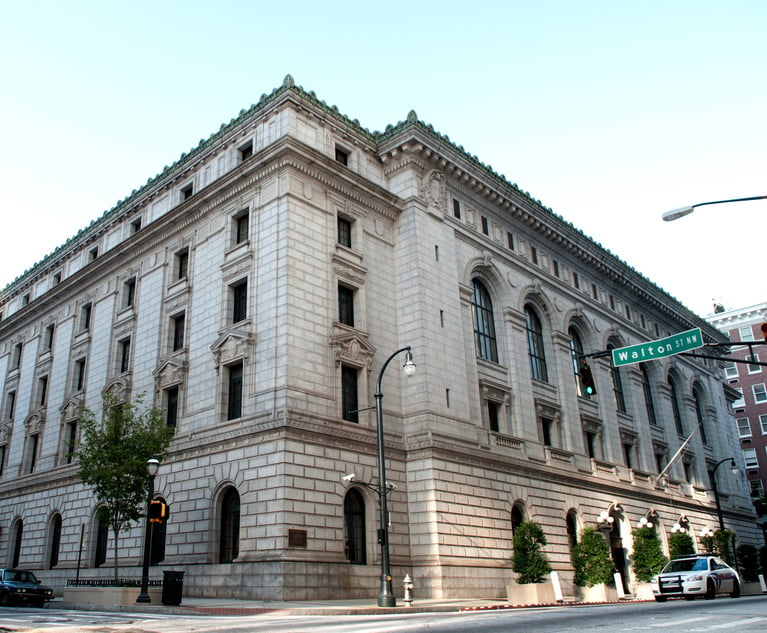 The U.S. Court of Appeals for the Eleventh Circuit. Photo: Rebecca Breyer/ALM
The U.S. Court of Appeals for the Eleventh Circuit. Photo: Rebecca Breyer/ALM
In a legal dispute about overdraft fees charged to businesses, the U.S. Court of Appeals for the 11th Circuit ruled against a Florida credit union because it failed to pay a fee to an arbitrator.
The Atlanta-based appeals court last month upheld a lower court’s decision that denied an attempt by Space Coast Credit Union to enforce an arbitration clause in its master services agreement. The ruling will allow two businesses, Woodwerx LLC in Merritt Island, Fla., and True Touch Services LLC in Hiram, Ga., to continue their proposed class-action lawsuit against the $9 billion, Melbourne, Fla.-based credit union.
Recommended For You
In March 2023, Woodwerx filed an arbitration demand with the American Arbitration Association (AAA) over Space Coast’s alleged improper debit card fees. These included fees assessed on transactions authorized with sufficient funds and “fees-on-fees” scenarios where a previous fee, not a transaction, overdraws an account.
In April, AAA declined to arbitrate the case citing Space Coast’s failure to submit a consumer dispute resolution plan and pay the required fee.
The credit union responded days later, expressing interest in arbitration and requesting clarification from AAA.
By June 7 of that year, Woodwerx and True Touch Services filed their proposed class action lawsuit against Space Coast in U.S. District Court in Orlando. Two days later, Space Coast submitted the required documents and payment to the AAA.
After Space Coast moved to compel arbitration over the improper fees dispute, U.S. District Court Judge Daniel C. Irick ruled against the credit union because it had failed to perform its contractual obligations under the arbitration agreement. Specifically, the district court explained that Space Coast had failed to take the steps necessary for the AAA arbitration until over a month after the AAA had declined Woodwerx’s arbitration demand. By delaying, the district court concluded, Space Coast waived its contractual right to arbitrate.
The Appeals Court agreed.
“As the district court concluded, by ignoring the AAA’s letter for a month and a half until after a lawsuit was filed against it, Space Coast acted inconsistently with the intention to vindicate its contractual arbitration rights,” the Appeals Court wrote in its unanimous ruling. “The fact that it later attempted to comply with the AAA policies doesn’t resurrect the waived contractual right to arbitrate.”
Space Coast’s attorney declined to comment. Lawyers for Woodwerx and True Touch Services did not respond to a CU Times request for comment.
The proposed class action lawsuit challenges Space Coast’s overdraft practices, specifically its $30 fees on APSN (Authorize Positive, Settle Negative) transactions and the so-called fees-on-fees charges. APSN transactions are approved when accounts have sufficient funds, but the fees are imposed at settlement — which could be a few days later — when the account may have a negative balance or insufficient funds.
Woodwerx and True Touch alleged that the credit union improperly charged overdraft fees at the settlement stage, despite holding funds aside at authorization.
Woodwerx was charged $360 in overdraft fees on 12 transactions from 2019 to 2021 and True Touch was charged $300 in overdraft fees on 11 transactions in 2022, according to their lawsuit.
Space Coast disputed the characterization, referring to the transactions as APPSN — “approved positive, purportedly settle negative” — and argued that fees are correctly assessed at the time of payment, not authorization. The credit union asserted its member contract clearly distinguishes between the two phases.
“The contract says that Space Coast makes overdraft determinations and charges applicable fees when transactions are paid by the credit union. Importantly, the Membership Agreement lays out the difference between authorization and payment in plain English, such that there can be no confusion between the two different phases of processing signature debit-card transactions,” the credit union stated in it court filing.
The business owners also alleged the credit union charged overdraft or non-sufficient funds fees that were charged on fees initiated by a third-party merchants not the account holders.
“When a third-party merchant requests payment of a fee, the defendant (Space Coast) treats the merchant’s fee as a separate transaction subject to its own $30 fee from the defendant,” Woodwerx and True Touch alleged in their lawsuit. “This results in punitive $30 fees that are 60 times larger than the third-party merchant fee itself, which was the case here.”
Space Coast countered that the contract states that if any “item … posted to your account’’ — including “any applicable fee” —- causes a member to overdraft, then Space Coast may charge fees.
The credit union has asked a federal court judge to dismiss the proposed class action lawsuit.
Peter Strozniak can be reached at [email protected].
© Touchpoint Markets, All Rights Reserved. Request academic re-use from www.copyright.com. All other uses, submit a request to [email protected]. For more inforrmation visit Asset & Logo Licensing.







